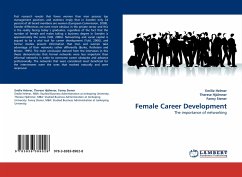Past research reveals that fewer women than men possess top management positions and statistics imply that in Sweden only 24 percent of all board members are women (European Commission, 2008). Gender differences are even more obvious in the private sector and this is the reality facing today's graduates, regardless of the fact that the number of female and males taking a business degree in Sweden is approximately the same (SCB, 2006). Networking and social capital is argued to be a vital tool for career development (Yukl, 2006), and former studies present information that men and women take advantage of their networks rather differently (Burke, Rothstein and Bristor, 1995). The main conclusion derived from the interviews in this thesis demonstrates that formal networks were less important than informal networks in order to overcome career obstacles and advance professionally. The networks that were considered most beneficial for the interviewees were the ones that evolved naturally and were reciprocal.
Bitte wählen Sie Ihr Anliegen aus.
Rechnungen
Retourenschein anfordern
Bestellstatus
Storno








